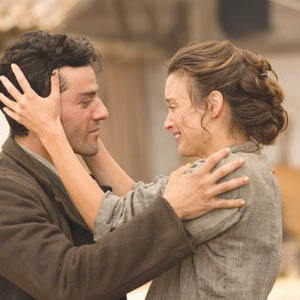
Michael Rettig
Editor
Like many Armenians, I had been eagerly anticipating the release of “The Promise” since first hearing that such a film would be released. I did not initially have high hopes when I heard that Kirk Kerkorian would be funding a Hollywood blockbuster about the Genocide because I had too often been disappointed with similar announcements in the past that did not come to fruition. However, on April 21 I found myself rushing to the opening weekend showing with high expectations. Our story was finally being told. “The Promise” did not disappoint and kept me returning for multiple viewings.
Although “The Promise” revolves around a love triangle between Chris Myers (Christian Bale), Mikael Boghosian (Oscar Isaac) and Ana Khesarian (Charlotte Le Bon), the romance never overwhelms the story. Rather, “The Promise” follows the protagonists as they are swept up in the Armenian Genocide and must struggle to deal with the horrors as best they can. The romance never fully engaged me as the director might have intended, but I did appreciate certain moments that kept the Genocide as the focus of the film. One such moment is when Myers stumbles upon Boghosian and Khesarian kissing on a beach near Musa Dagh. Rather than create a dramatic encounter between the three friends, Myers’ next lines are “here, let me help you” to an Armenian refugee. This was a story of love tragically interrupted by genocide.
“The Promise,” as the first major Hollywood film about the Genocide, had an obligation to accurately portray the events of 1915 to a wide audience with little exposure to the topic. The movie succeeds in this regard and provides an effective introduction to the history. Rather than delve into any one theme of the Genocide in great depth, “The Promise” provides a grander overview of events from the mob riots in Istanbul, to the arrest of intellectuals, the labor battalions of Armenian men, German involvement in the Ottoman Empire, the death marches, foreign aid to Armenian orphans, moments of resistance, and more. After viewing the film with fellow graduate students from the History Department, many of them described feeling acutely aware of their prior ignorance of the Genocide and were eager to read more about the topic.
One critique I have of the movie is the writing. Much of the dialogue came across scripted. Khesarian’s line that she was born in Paris “but I’m a proud Armenian” rang hollow. Often the moments of silence were most effective. There was a particular scene when Myers and Khesarian shared a silent conversation that conveyed emotion more effectively than words. Khesarian, who was living with Myers, had just brought Mikael Boghosian’s relatives to their apartment for refuge. When Myers confronted her in the bathroom, their gaze communicated a deep understanding of the enormity of their situation and a hardened resolve to aid the Boghosians in any way possible. While some of the lines resulted in two-dimensional characters, per-formances by Oscar Isaac and Marwan Kenzari, as the noble carefree Turkish medical student, Emre Ogan, carried the show.
“The Promise” is an especially important film to support considering Turkish efforts to sabotage the distribution of the movie and deny the events surrounding it. Mikael’s challenge to the doubting villager at the foot of Musa Dagh doubly served as a challenge to those who would deny the Genocide. “Go out and see! Follow the vultures and the smell…!” as if to say to denialists, “the evidence is there if you but open your eyes!”
Watching this film with a sold-out Armenian audience was particularly moving. All of us saw our ancestors in the faces of the Armenians portrayed in “The Promise.” At the film’s conclusion, viewers were left with mixed emotions of joy and grief; joy that we have survived as a race, joy that such a film has finally been created, but grief at the horrors that our ancestors suffered. “The Promise” is an important memorial to those lost in the Genocide that will continue to educate people for many years to come.
 Hye Sharzhoom Armenian Action
Hye Sharzhoom Armenian Action